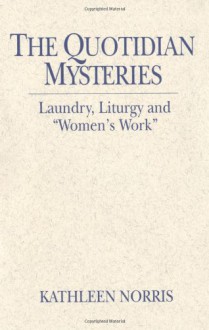 This is actually the first book I read by Kathleen Norris, because I found the title intriguing. It is the text of a lecture the author gave in 1998 that was sponsored by the Center for Spirituality at Saint Mary's College at Notre Dame."Quotidian means occurring every day, belonging to every day; commonplace, ordinary." The author finds that, like Therese of Lisieux, Christ was most abundantly present to her not "during my hours of prayer... but rather in the midst of my daily occupations" (quote from "Story of a Soul" by Therese of Lisieux). God cares about the least of our daily tasks. Jesus instructed us in the Lord's Prayer to pray for our daily bread. So making bread is important. Jesus knelt and washed the feet of his disciples. Serving others is important. Serving through cleaning, doing laundry, preparing a meal. These are all signs of caring, signs of serving others, indications of our love for those we do them for. These are the types of tasks that are never done. And they shouldn't. Who wants to say, "well, I cooked and served you this wonderful meal to show I care. Now you know, so I never need to do it again." Or, "I've washed and ironed your clothes. That means I love you. Now you know, so I don't need to do this ever again for you, because you know." You eat, but are hungry again. You wash, but the clothes get dirty and need to be laundered again. These are quotidian things. And doing them over and over again demonstrates our love and our care. Because of that, ordinary tasks become holy tasks that transform us. Carrying out holy work makes us holy because we are serving others. Contrary to conventional thought, cooking and cleaning for others does not make us less intelligent or less important or less significant. What God does to us and with us and through us as we carry out seemingly unimportant tasks is the quotidian mystery. Liturgy, like laundry, is never done. You don't just do it once and are finished. It is ongoing. And participating in it repeatedly and regularly transforms us into the image of Christ, suitable for holy work. Even the holy work of serving others in quotidian tasks.
This is actually the first book I read by Kathleen Norris, because I found the title intriguing. It is the text of a lecture the author gave in 1998 that was sponsored by the Center for Spirituality at Saint Mary's College at Notre Dame."Quotidian means occurring every day, belonging to every day; commonplace, ordinary." The author finds that, like Therese of Lisieux, Christ was most abundantly present to her not "during my hours of prayer... but rather in the midst of my daily occupations" (quote from "Story of a Soul" by Therese of Lisieux). God cares about the least of our daily tasks. Jesus instructed us in the Lord's Prayer to pray for our daily bread. So making bread is important. Jesus knelt and washed the feet of his disciples. Serving others is important. Serving through cleaning, doing laundry, preparing a meal. These are all signs of caring, signs of serving others, indications of our love for those we do them for. These are the types of tasks that are never done. And they shouldn't. Who wants to say, "well, I cooked and served you this wonderful meal to show I care. Now you know, so I never need to do it again." Or, "I've washed and ironed your clothes. That means I love you. Now you know, so I don't need to do this ever again for you, because you know." You eat, but are hungry again. You wash, but the clothes get dirty and need to be laundered again. These are quotidian things. And doing them over and over again demonstrates our love and our care. Because of that, ordinary tasks become holy tasks that transform us. Carrying out holy work makes us holy because we are serving others. Contrary to conventional thought, cooking and cleaning for others does not make us less intelligent or less important or less significant. What God does to us and with us and through us as we carry out seemingly unimportant tasks is the quotidian mystery. Liturgy, like laundry, is never done. You don't just do it once and are finished. It is ongoing. And participating in it repeatedly and regularly transforms us into the image of Christ, suitable for holy work. Even the holy work of serving others in quotidian tasks.

 Log in with Facebook
Log in with Facebook 







